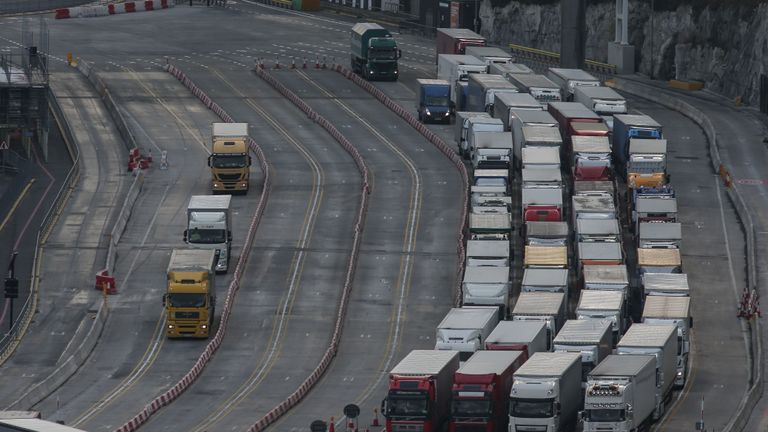Emergency plans drawn up by the government to protect the UK if a second coronavirus spike coincides with a no-deal Brexit have been revealed.
A Cabinet Office “reasonable worst-case scenario” document, dated July 2020, has been leaked to The Sun newspaper.
A government spokeswoman said it “reflects a responsible government ensuring we are ready for all eventualities”.
The dossier warns that the military could be required to airdrop food to the Channel Islands.
The navy may be required to stop British fishermen clashing with illegal European fishing boat incursions, the document adds.
There could be power and petrol shortages in parts of the UK if thousands of lorries end up stranded in Dover, it also warns.
In addition, the assessment says shortages of medicines due to port blockages could lead to animal diseases spreading through the countryside.
It also warns of the possibility of hospitals being overwhelmed, if trade restrictions sparked by a no-deal Brexit combine with floods, flu and a second wave of coronavirus.
The prospect of town halls going bust is mentioned, along with the possibility of deploying troops on the streets if there is public disorder.
There are fears that the winter months could see a second wave of COVID-19 in the UK.
The latest available statistics show that more than 324,000 people have tested positive for the virus in the UK.
A total of 41,423 people have died in the UK within 28 days of testing positive for the disease.
Britain left the EU in January after 47 years of membership and is currently in an 11-month transition period, which means it is continuing to follow the bloc’s rules and regulations.
This time frame is being used to negotiate a free trade agreement and sort out the terms of the future relationship that will govern ties between the UK and the EU moving forward.
Listen to the Daily podcast on Apple Podcasts, Google Podcasts, Spotify, Spreaker
Both sides have said a deal needs to be agreed by October in order for it to be ratified in time, but so far there has been no breakthrough.
Speaking after the latest round of talks finished earlier this week, EU negotiator Michel Barnier said it felt “as if we were going backwards more than forwards”.
UK negotiator David Frost said that while the latest negotiations in Brussels had been “useful”, there had been “little progress”.
Cabinet Office Minister Michael Gove said: “We got Brexit done with a great deal in January and we are working flat out to make sure the United Kingdom is ready for the changes and huge opportunities at the end of the year as we regain our political and economic independence for the first time in almost 50 years.
“Part of this work includes routine contingency planning for various scenarios that we do not think will happen, but we must be ready for come what may.
“Whether we trade with the EU on terms similar to Canada or to Australia, a brighter future awaits as we forge our own path.”
A government spokeswoman added that “intensive planning is under way to help ensure that businesses and citizens are ready to take advantage of the opportunities and changes” that leaving the bloc’s single market and customs union will bring.
She continued: “As a responsible government we continue to make extensive preparations for a wide range of scenarios, including the reasonable worst case.
“This is not a forecast or prediction of what will happen but rather a stretching scenario.
“It reflects a responsible government ensuring we are ready for all eventualities.”


